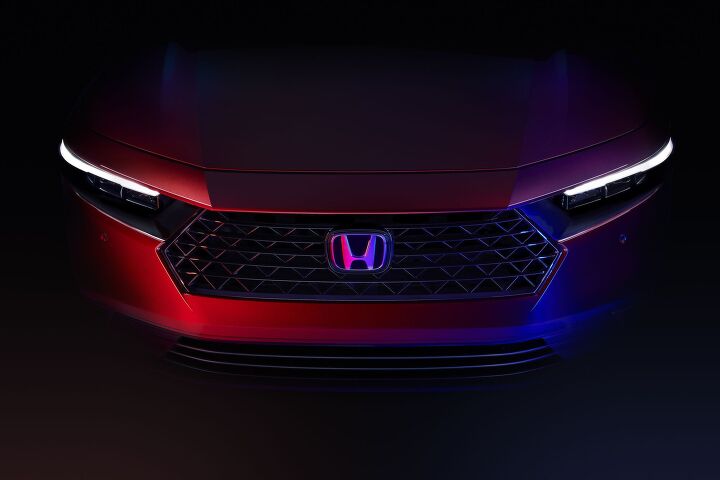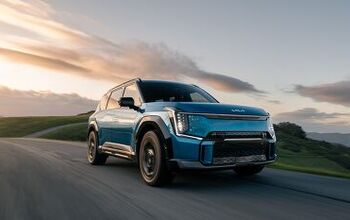Honda Teases New Accord: Updated Styling, Google Tech

On Tuesday, Honda teased the arrival of the 11th generation Accord – offering a series of darkened photos and just enough relevant information to whet one’s appetite.
The manufacturer is calling the updated model “sporty, modern, smart, and comfortable” while vowing it’ll have a sleek design that seems to be following in the footsteps of the new Civic and CR-V. That means understated but rather elegant bodywork that might not be as aggressive as its predecessor but is arguably more in sync with Honda’s historic styling decisions. Think less contemporary and more timeless.
While largely obfuscated by shadows, Honda’s sedan now appears to have LED lighting that underscores how the vehicle has been sculpted. The chrome-free grille is also new and appears to have a triangular, or perhaps, diamond theme. On the opposite end of the vehicle, Honda has stretched the Accord’s tail lamps all the way across its width. But designers stopped short of making it a singular piece by adding a tastefully small Honda emblem smack-dab in the middle.
The Honda Accord is one of those vehicles that everyone seems to appreciate – from the average commuter who cares nothing about cars to the enthusiast that obsesses over every inch of a vehicle. Granted, the Accord is no longer the brand’s mainstay since the CR-V became Honda’s top-selling product. But the sedan, along with the smaller Civic, still represents an important market for the Japanese automaker and is clearly a vehicle it takes real pride in building.
Your author has long held the conspiracy theory that American automakers didn’t just abandon small, traditional automobiles to expand their per-vehicle profit margins. But also because they were being outclassed by the Japanese. There were certainly exceptions to the rule (e.g. Ford Fusion), however, U.S. brands seemed to realize that they were engaged in a losing battle with the Honda Accord and Toyota Camry in terms of mainstream appeal. Unless they were offering something truly unique, sticking with sedans was a losing proposition for American brands so they effectively handed it off to their non-domestic rivals. In exchange, U.S. companies focused on building crossovers, SUVs, and pickup trucks (a high-margin segment they absolutely dominate).
We can argue whether that puts more or less pressure on the Accord in the modern era, especially with sedan volumes trending down for roughly a decade. But that won’t change the fact that this remains an important vehicle for the Honda brand. As such, it’s getting an overall refresh that’s about more than just looks. The manufacturer wants to modernize the model by adding connectivity features and freshening its looks, without obliterating the characteristics that made it a winner in the first place.
With that in mind, Honda has also cleverly shown the 12.3-inch infotainment display running Google apps. The company announced that it would be working with the tech firm in 2021 to deliver upgraded connectivity features (e.g. an in-car voice assistant, upgraded navigation, new applications) and appears to be baking that into the 11th-generation Accord. These aren’t necessarily going to be desirable inclusions for everyone with serious privacy concerns (Google, like Amazon, has a bad track record in terms of transparency). But they do offer useful features, especially upgraded navigation, that many less-scrutinizing consumers will appreciate. Truth be told, a lot of the proprietary systems being offered by automotive companies haven’t been all that good. So a lot of brands have begun establishing partnerships with big tech to give themselves a competitive edge. However, the Accord’s current infotainment system never felt all that lacking from this end.
Honda hasn't released any official information about the sedan’s powertrains. Though it’s obvious to see (based on the teasers) that a hybrid option will be available. It’s also likely that the base Accord will still be internal combustion only, with the model likely to retain the current 192 horsepower, turbocharged 1.5-liter four-cylinder and perhaps the fancier 252 hp, 2.0-liter turbo that’s found in higher trims. While neither is bad, the latter option does make it more exciting to drive. We’d love to see it (even a de-tuned version) become the base powertrain, provided it doesn’t add a lot to the Accord’s price.
[Images: Honda]

A staunch consumer advocate tracking industry trends and regulation. Before joining TTAC, Matt spent a decade working for marketing and research firms based in NYC. Clients included several of the world’s largest automakers, global tire brands, and aftermarket part suppliers. Dissatisfied with the corporate world and resentful of having to wear suits everyday, he pivoted to writing about cars. Since then, that man has become an ardent supporter of the right-to-repair movement, been interviewed on the auto industry by national radio broadcasts, driven more rental cars than anyone ever should, participated in amateur rallying events, and received the requisite minimum training as sanctioned by the SCCA. Handy with a wrench, Matt grew up surrounded by Detroit auto workers and managed to get a pizza delivery job before he was legally eligible. He later found himself driving box trucks through Manhattan, guaranteeing future sympathy for actual truckers. He continues to conduct research pertaining to the automotive sector as an independent contractor and has since moved back to his native Michigan, closer to where the cars are born. A contrarian, Matt claims to prefer understeer — stating that front and all-wheel drive vehicles cater best to his driving style.
More by Matt Posky
Latest Car Reviews
Read moreLatest Product Reviews
Read moreRecent Comments
- TheEndlessEnigma I would mandate the elimination of all autonomous driving tech in automobiles. And specifically for GM....sorry....gm....I would mandate On Star be offered as an option only.Not quite the question you asked but.....you asked.
- MaintenanceCosts There's not a lot of meat to this (or to an argument in the opposite direction) without some data comparing the respective frequency of "good" activations that prevent a collision and false alarms. The studies I see show between 25% and 40% reduction in rear-end crashes where AEB is installed, so we have one side of that equation, but there doesn't seem to be much if any data out there on the frequency of false activations, especially false activations that cause a collision.
- Zerocred Automatic emergency braking scared the hell out of me. I was coming up on a line of stopped cars that the Jeep (Grand Cherokee) thought was too fast and it blared out an incredibly loud warbling sound while applying the brakes. I had the car under control and wasn’t in danger of hitting anything. It was one of those ‘wtf just happened’ moments.I like adaptive cruise control, the backup camera and the warning about approaching emergency vehicles. I’m ambivalent about rear cross traffic alert and all the different tones if it thinks I’m too close to anything. I turned off lane keep assist, auto start-stop, emergency backup stop. The Jeep also has automatic parking (parallel and back in), which I’ve never used.
- MaintenanceCosts Mandatory speed limiters.Flame away - I'm well aware this is the most unpopular opinion on the internet - but the overwhelming majority of the driving population has not proven itself even close to capable of managing unlimited vehicles, and it's time to start dealing with it.Three important mitigations have to be in place:(1) They give 10 mph grace on non-limited-access roads and 15-20 on limited-access roads. The goal is not exact compliance but stopping extreme speeding.(2) They work entirely locally, except for downloading speed limit data for large map segments (too large to identify with any precision where the driver is). Neither location nor speed data is ever uploaded.(3) They don't enforce on private property, only on public roadways. Race your track cars to your heart's content.
- GIJOOOE Anyone who thinks that sleazbag used car dealers no longer exist in America has obviously never been in the military. Doesn’t matter what branch nor assigned duty station, just drive within a few miles of a military base and you’ll see more sleazbags selling used cars than you can imagine. So glad I never fell for their scams, but there are literally tens of thousands of soldiers/sailors/Marines/airmen who have been sold a pos car on a 25% interest rate.




































Comments
Join the conversation
Shoot, is the new Accord a joint venture with Ford!
been an accord guy my whole life